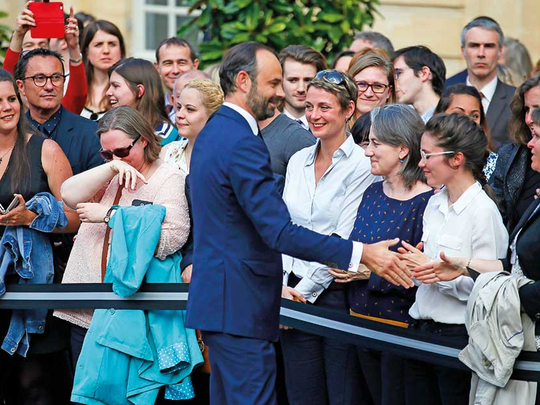
PARIS: President Emmanuel Macron of France named Edouard Philippe, a moderate centre-right lawmaker, as prime minister Monday, making his first major political decision a day after being formally installed as the country’s leader.
Macron, who ran as an independent centrist after leaving the Socialist Party, is expected to name the rest of his Cabinet by the middle of the week. The selection of Philippe, 46, from of the centre-right party the Republicans, was announced by Alexis Kohler, the president’s secretary-general, in the courtyard of the Elysee Palace.
The head of France’s main right-wing party reacted coolly on Monday towards the appointment, saying it was an ambiguous move and unclear what political line he would follow.
“This is an individual decision. It is not a political agreement,” Bernard Accoyer, secretary general of The Republicans party, told journalists.
Macron himself, inaugurated on Sunday, heads a start-up party, Republic on the Move (REM), which is hoping to achieve a majority in parliamentary elections in June.
Referring to “ambiguity” that was now prevailing, Accoyer said: “Will this new prime minister support the candidates of En Marche of the President … or will he support the candidates of The Republicans-UDI, the candidates of his own political family?”
Philippe, who is also the mayor of the northern port city of Le Havre, is a close political ally of Alain Juppe, a former prime minister who ran, unsuccessfully, in the centre-right presidential primary last year, and who is also a central figure of the Republicans’ centrist wing.
Philippe was not a nationally known figure in France until last week, when the media started reporting that he was one of the main candidates being considered for prime minister.
Before his nomination Monday, French television channels frantically covered his movements live, with cameramen on motorbikes following his taxi through Paris.
Macron, 39, who had never held elective office before winning the presidential race May 7, became the youngest head of state in modern French history when he was installed as leader Sunday. He was scheduled to travel to Berlin later Monday for talks with Chancellor Angela Merkel.
In many ways, Philippe mirrors Macron: Both are younger than most French politicians, both went to top French universities and both have worked in the private sector.
Macron was an investment banker for Rothschild, and Philippe worked as a lawyer for the US firm Debevoise & Plimpton, and as head of public affairs for Areva, the French nuclear power giant.
“I believe they know and like each other, because of their intellectual honesty and their rigor,” Benjamin Griveaux, a spokesman for Macron and a candidate in the legislative elections in June, said on Europe 1 radio.
The nomination of a centrist Republican as prime minister could play a crucial role as Macron tries to convince more moderates to join his En Marche! (Onward!) movement before those elections - or at least to work with the organization in Parliament. All 577 seats in the National Assembly, France’s lower house of Parliament, are up for grabs.
Macron’s election this month rattled France’s traditional political parties, and he wants to pull in moderates from both the Republicans and the Socialists, France’s traditional left-wing formation, to marginalise both of those parties.
“I am convinced that the Republicans will split because that is the way political life is being reshaped,” Macron said in an interview with Le Parisien before the second round of the presidential election, in which he defeated the far-right candidate Marine Le Pen.
French presidents are free to choose their prime ministers, but only if they hold a majority in the National Assembly. If that is not the case, the party that dominates the assembly has the leverage to insist that one of its members become prime minister.
That means that Macron could be forced to replace his prime minister, depending on the outcome of the June elections.












